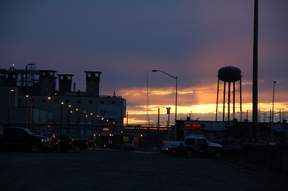 Ryan Land, who arrived in Thompson nine years ago this month to become principal of R.D. Parker Collegiate, moves now to Sudbury for an expanded role with Vale. He joined Vale in May 2011 and has spent recent years as Manitoba Operations’ manager of corporate affairs, organizational design and human resources. Land became Vale’s manager of corporate affairs for Manitoba Operations May 9, 2011.
Ryan Land, who arrived in Thompson nine years ago this month to become principal of R.D. Parker Collegiate, moves now to Sudbury for an expanded role with Vale. He joined Vale in May 2011 and has spent recent years as Manitoba Operations’ manager of corporate affairs, organizational design and human resources. Land became Vale’s manager of corporate affairs for Manitoba Operations May 9, 2011.
In an Aug. 27 Vale human resources bulletin sent to employees in Ontario and Manitoba, Angie Robson, based in Sudbury, and manager of corporate affairs and sustainability for Vale’s North Atlantic Operations and Asian refineries, said that Land will be the manager of corporate and indigenous affairs for Ontario and Manitoba effective Sept. 4. Robson said Land will report directly to her.
In between working for the School District of Mystery Lake and Vale, Land worked out of Thompson briefly in the run-up to the 2011 federal election campaign for then Elections Canada assistant returning officer Lou Morissette as a training officer looking after all the inland training for the polls. A bit earlier, Land had been offered the position of part-time vice-principal of Hapnot Collegiate in Flin Flon, but turned it down, trustee Glenn Smith, chair of the Flin Flon School Division board of trustees, told the Flin Flon Reminder at the time.
Before becoming principal of R.D. Parker Collegiate in August 2009, Land had spent the previous academic year in West Africa as principal of the Canadian Independent College of Ghana in Accra, a Canadian university preparatory co-ed college day and boarding school. Land completed one year of a five-year contract in Ghana, but, as was allowed in his contract, resigned from the position for family-related reasons.
The Canadian Independent College of Ghana is a licensed sister campus to the Canadian Independent College (CIC), a co-ed university preparatory college, formerly known as the North Wilmot School, which opened in 1964 and is located in Baden, Ontario. It is a member of the Council of Advanced Placement Schools in Ontario.
On April 27, 2010 trustees from the School District of Mystery Lake took the extraordinary step of publicly rebuking Land during a board meeting and announced that his probationary status as principal of R.D. Parker Collegiate which would normally be one year in duration, was being extended another year after a unanimous vote by the board of trustees, who had considered the option of terminating Land’s employment, but ultimately decided not to.
Trustees then twice in identical 5-2 splits on Feb. 22 and April 5, 2011, voted to remove him as probationary principal.
Then in mid-June 2011, trustees subsequently fired Land for cause – four months after they had removed him as probationary principal. At a trustees meeting the day before graduation, former superintendent Bev Hammond provided details of an investigation she said she had conducted, which she said found that students had had marks changed without doing remedial work, responsibility for which she later laid at the feet of Land in an interview with the Thompson Citizen. Hammond’s marks-changing investigation focused only on the years that Land was principal.
A year later, the saga, which generated strong feelings and emotions, with plenty of both pro and anti-Land sentiment, and national media coverage, ended when the school board and Land reached a deal, resulting in an arbitration hearing that had been set to begin June 18, 2012, being cancelled. Both Land and the SDML withdrew all claims against each other and ended litigation between the parties.
Land offered his resignation to the SDML June 14, 2012, effective Nov. 18, 2011. The school board accepted Land’s resignation and rescinded his termination.
Two years later, in what supporters saw as a rich case of poetic justice, Land would run for a trustee’s seat in the October 2014 municipal election for school board, where he not only won a seat, but was the top vote-getter among all candidates picking up 2,177 votes.
While his seven-year tenure as Vale’s often public face in Thompson has been marked by substantial downsizing, first announced by the company in November 2010, Land himself has not been involved in controversies or gaffes, and moves onto his new posting with an able record at Vale’s Manitoba Operations.
Land’s role within Vale that will be based in Sudbury, but he posted on Facebook Aug. 25 that he “will be in Thompson approximately 50-50 over the next few months (with accountabilities in Manitoba in the new role over the longer term).”
While most of the focus over the last year has been on the approximately 187 USW miners and above-ground workers laid off to date with Birchtree Mine being again placed on “care and maintenance” and the smelter and refinery being permanently closed, Land’s transfer to Sudbury is part of a Vale back story on office staff reductions, too, locally, as Thompson is no longer a fully integrated nickel operation for the first time since March 1961, and logically no longer requires the same level of daily on-site support based here in Thompson as a fully integrated operation did.
Mark Scott’s employment, as Vale Manitoba Operations vice-president, ended July 20 as the company has reorganized the management structure for its North Atlantic operations and Asia refineries division and eliminated the position Scott held at the top of the local Vale hierarchy.
Alistair Ross, previously the director of Ontario mining operations, also based in Sudbury, is now in charge of mining operations for the North Atlantic division, including mines in Sudbury and mining and milling operations in both Thompson and Voisey’s Bay.
You can also follow me on Twitter at: https://twitter.com/jwbarker22

